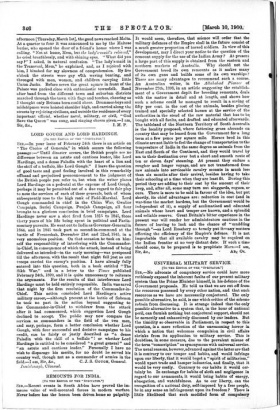LORD GOUGH AND LORD HARDINGE.
[To TRE EDITOR Or TUE "SPECTATOR."]
Sr,—In your issue of February 24th there is an article on "The Choice of Generals," in which occurs the following passage :—" Until disaster occurs, the British people see no difference between an astute and cautions leader, like Lord Hardinge, and a dense Paladin with the heart of a lion and the skill of a buffalo, like Lord Gough." I leave the question of good taste and good feeling involved in this remarkably offhand and prejudiced pronouncement to the judgment of the British people you refer to, but when the writer places Lord Hardinge on a pedestal at the expense of Lord Gough, perhaps it may be permitted out of a due regard to fair play to note the services of each of these generals, both of whom subsequently rose to the high rank of Field-Marshal. Lord Gough commanded in chief in the China War, Gwalior Campaign, Sutlej Campaign, Punjab Campaign, all four brought to a glorious conclusion in brief campaigns. Lord Hardinge never saw a shot fired from 1815 to 1845, those thirty years of his life being spent in political and Parlia- mentary pursuits. He went out to India as Governor-General in 1844, and in 1845 took part as second-in-command at the battle of Ferozeshah, December 21st and 22nd, 1845, in a very anomalous position. On that occasion he took on him- self the responsibility of interfering with the Commander- in-Chief, in consequence of which the attack, instead of being delivered as intended—in the early morning—was postponed till the afternoon, with the result that night fell just as our troops carried the enemy's position. I have already fully entered into this question, both in a book entitled "The Sikh War," and in a letter to the Tittles published February 24th, 1899, and it is quite unnecessary to reiterate the aruuments. For the results of that interference Lord Hardline must be held entirely responsible. India was saved that night by the firm resolution of the Commander-in- Chief. This action concluded Lord HardingeS active military career,—although present at the battle of Sobraon he took no part in the action beyond suggesting to the Commander-in-Chief to withdraw from the attack after it had commenced, which suggestion Lord Gough declined to accept. The public may now compare the services as commanders in the field of the two men, and may, perhaps, form a better conclusion whether Lord Gough, with four successful and decisive campaigns to his credit, can be fairly or justly described as "a dense Paladin with the skill of a buffalo " ! or whether Lord Hardinge is entitled to be considered "a great general" and "an astute and cautions leader." Personally I have no wish to disparage his merits, for no doubt he served his country well, though not as a commander of armies in the






































 Previous page
Previous page